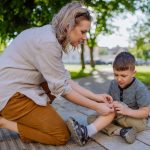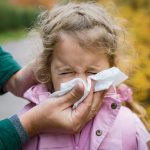
The Benefits of Resilience for Children
Resilience is the ability to recognize challenges, face them, and overcome them. Through the process of overcoming challenges, a resilient person is strengthened rather than defeated. We are all born with the capacity for resilience. It can also be taught, and it can be improved upon. Research has shown that resilience will allow a person to overcome adverse childhood events, build strength, and can even reduce anxiety and depression in children and teenagers.
We know that our children will one day experience some stressful life circumstances: loss of a loved one, family stress, peer rejection, bullying, relationship break ups, anxiety, depression, and more. As parents, we would do anything to lessen the impact of these experiences on our kids – and it turns out, we can by helping our kids become more resilient. Being there to listen, encourage, and support our kids can make all the difference in how they respond to life’s challenges.
More than 20 years of research has been done to look at ways to help children and adults overcome adverse experiences. Studies have shown that resilience as a quality can:
- Improve optimism
- Reduce anxiety and depression
- Build academic strengths and success
As pediatricians, we believe in being proactive, and we are strong advocates of preventive medical care. We believe that resilience has a protective effect against adverse childhood experiences. In effect, we believe that resilience is a vaccine to guard and protect us from the toxic effects of stress. This is true for adults as well as children. We all can benefit from being more resilient.
Metropolitan Pediatrics, in partnership with the Children’s Health Alliance, offers an innovative and progressive program to teach parents and children how to become more resilient. We talk about it at well visits, share resources, and offer services and websites to enhance this education. We believe that increasing resilience will result in physically and emotionally healthier kids, adults, and families.
What are the Characteristics of Resilient People?
Research has shown that resilient people have the following personal characteristics. Nobody has all of these characteristics, but this list can show us some features to aim for:
- Relationships: to be a friend and relate well to people; empathy; compassion; respect
- Optimism: expecting a positive future
- Flexibility: ability to change in order to cope with situations
- Competence: being good at something – grades, sports, art, music, friendship, communication
- Confidence: in self-worth, in handling situations
- Perseverance: not giving up
- Creativity: both in expressing yourself (art, music, etc.) and in problem solving
- Spirituality: personal faith in something greater
- Sense of humor
- Character: a clear sense of right and wrong and a desire for justice
- Independence: strength in resisting following unhealthy people or situations
Environmental factors can also strengthen resilience:
- Strong parental figure
- A supportive adult: family member, teacher, community worker
- A reliable group of friends: knowing that “someone is on my team”
- Connection: with peers, in school, in community
- Contribution: service to others in words and deeds; altruism
- Strong cultural identity and ethnic pride
Building Resilience Helps Kids Bounce Back from Setbacks
Here at Metropolitan Pediatrics, we like to look at each challenge in your child’s life as a building block, rather than a stumbling block. We help families grow from their experiences by teaching parents ways to support their kids during difficult times and children how to deal with stress and emotions in healthy ways.
Although life can get tough, we all have the amazing ability to bounce back from any problem, building confidence and skills to handle the next! It’s called resilience, and it’s an important skill for growing up healthy.
Below is a brief overview of some of the ways we support kids and families in building resilience.
Circle of Support
Children who have supportive adults in their lives grow up to be more resilient adults. Our pediatricians can help parents learn a variety of ways to be more supportive, starting with education surrounding the importance of support systems for children and families.
Value of Failure
Failure can teach us important life lessons, such as persistence and patience. Instead of protecting children from failure, we encourage parents to coach them through it with affirmation, optimism, and strength. Allowing children to experience minor failures early in life can build resilience for future, more serious life challenges.
Special Time
Set aside 10-15 minutes at least three times a week to offer your child your undivided attention. Give it a name such as “Joey’s Time” and make it a special part of his day. Follow your child’s lead and go with the flow during your “special time” together. You’ll find this brief time to connect really makes a difference in the quality of your relationship and your child’s behavior throughout the day.
Family Time
Resilient kids feel connected to others, most importantly, their family. Parents need to find a way to make family time a priority, even when life gets busy. Take advantage of opportunities when you can – in the car, during mealtimes, or while doing daily activities – to connect with your child. Ask your pediatrician for ideas to make the most of your limited time together!
Conversations That Matter
Another way to encourage connection is to have “Conversations that Matter.” Ask open-ended questions with the intent of teaching your child something important.
Here’s an example: When a problem arises, ask: “How do you think we can solve this?”
This question is an opportunity for children to learn that problems can have more than one solution. Talk through the pros and cons of the issue and the possible consequences of each decision. Show your children how to approach problems with responsibility and maturity. Encourage them to advocate for themselves and ask for help when needed.
Contribution
Teaching children the value of contribution and service to others helps grow their connection with their family, friends, school, and community. Helping others shows kids that they have something valuable to offer to the world and is a positive experience for everyone involved.
Child’s Strengths
Give children confidence in who they are and what they can do. Point out their strengths and reinforce them with positive words. The knowledge that they own these gifts empowers them to use them.
How Positive Childhood Experiences Can Protect Kids From ACEs
Adverse Childhood Experiences (ACEs), or traumatic events that happen early in life, are associated with toxic stress, which can lead to lifelong physical and emotional health problems. Studies have shown that resilience can offset the long-term effects of toxic stress from trauma. In other words, positive childhood experiences can help build resilience and protect kids, like a vaccine, from the damaging effects of traumatic experiences.
Learn More
For more information on the toxic effects of adverse childhood experiences, please watch the TED Talk “How Childhood Trauma Affects Health across a Lifetime,” by Nadine Burke-Harris, MD.
For more information on resilience, please visit the following websites:








